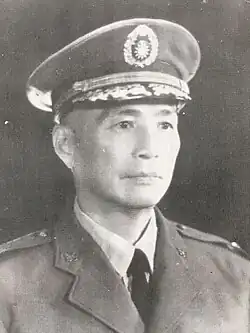Cai Xiaoqian
Cai Xiaoqian | |
|---|---|
蔡孝乾 | |
 Cai in Republic of China Army uniform | |
| Secretary of the Taiwan Provincial Working Committee of the Chinese Communist Party | |
| In office March 1946 – August 1950 | |
| Preceded by | Committee established |
| Succeeded by | Committee abolished |
| Personal details | |
| Born | 22 January 1904 Huatan, Japanese Taiwan |
| Died | 8 October 1982 (aged 78) Taipei, Taiwan |
| Political party | Kuomintang (1950–1982) |
| Other political affiliations | Taiwanese Communist Party (1928–1931) Chinese Communist Party (1925–1950) |
| Alma mater | Shanghai University |
| Military service | |
| Allegiance | Republic of China |
| Branch/service | Republic of China Army |
| Years of service | 1956–1982 |
| Rank | Major general |
Cai Xiaoqian (traditional Chinese: 蔡孝乾; simplified Chinese: 蔡孝干; Wade–Giles: Tsai Hsiao-chien; Taiwanese Hokkien: Tshuà Hàu-khiân; 22 January 1904 - 8 October 1982)[1]was a Taiwan-born Chinese Communist politican who was served as the secretary of the Taiwan Provincial Working Committee of the Chinese Communist Party. He defected to the Kuomintang after he was arrested in 1950, revealing his knowledge of the Chinese Communist Party's underground operations in Taiwan. For his contribution to the dismantling of the communist networks in Taiwan, he was promoted to major general of the Republic of China Army in 1956.
Career
Cai was born in modern Huatan, Japanese Taiwan in 1904. He left for Mainland China in 1924 to study at the Department of Social Sciences at the Kuomintang-Communist operated Shanghai University. He joined the Chinese Communist Party in 1925. He returned to his hometown in 1927, where he was imprisoned for 10 months after promoting communist ideology.[2] In 1928, he joined the Taiwanese Communist Party in Shanghai and served as director of the party's Propaganda and Agitation Department. Under pressure from the Japanese authorities, the party dissolved in 1931.[3]
In 1932, Cai became the editor for the Warrior Newspaper (戰士報) of the Political Department of the Chinese Red Army's 1st Corps. In 1934, he was elected as a member of the Central Committee of the Chinese Soviet Republic. He was the only Taiwan native who participated in the Long March. He then served as the Minister of the Interior of the Chinese Soviet Republic. In 1940, he served as the Minister of the Enemy Workers Department.
In September 1945 he was sent by the Communist Party to Taiwan and was tasked with managing the Taiwan Provincial Working Committee of the Chinese Communist Party. The February 28 incident in 1947 caused a rise in members for the Taiwan Provincial Working Committee; in 1948, Cai became an editor of the anti-Kuomintang Guangming Daily (光明報) newspaper founded by middle school principal Chung Hao-tung, brother of Chung Li-ho. After copies of the paper were sent by Chen Cheng to Chiang Kai-shek, Chiang personally ordered a thorough investigation into it.[3]
Arrest and defection
The investigation into the Guangming Daily saw the arrest of many communists in Taiwan; Cai himself was arrested by the Kuomintang in January 1950. While in prison, he defected to the Kuomintang, revealing his knowledge of the underground communist operations in Taiwan. Some of Cai's comrades defected to the Kuomintang as well, while others, including Zhu Feng and lieutenant general Wu Shi were executed later in 1950.[4][5]
The Nationalist government rewarded Cai with a promotion to major general in the Republic of China Army and a position as the deputy director of the Ministry of Justice Investigation Bureau, although he was under some degree of surveillance for the rest of his life.[3][4]
Cai died at the Taipei Veterans General Hospital on 8 October 1982 at the age of 78, and was buried at the Yangmingshan First Cemetery in Beitou District.[1]
References
- ^ a b 花壇鄉志 [Huatan Hometown] (in Chinese). 彰化縣花壇鄉公所 (Changhua County Huatan Township Office). 2006. pp. 696–697. ISBN 978-986-00-5852-9.
- ^ Chang, Fang (May 2002). "蔡孝乾其人其事". Straits Review Monthly. Retrieved 2025-08-11.
- ^ a b c Tsou, Tzung Han (2021-06-24). "中共在台灣:蔡孝乾與曇花一現的台共組織". dw.com (in Chinese). Retrieved 2025-08-11.
- ^ a b 國家發展委員會檔案管理局 (2014-01-01). "國家發展委員會檔案管理局-檔案支援教學網>威權統治時期的女性政治受難者>以參加叛亂組織判刑的「政治犯」>任職於郵局的女員工". art.archives.gov.tw (in Chinese). Archived from the original on 2025-04-07. Retrieved 2025-08-11.
- ^ "吳石". Chinese Culture University. Retrieved 2025-08-11.